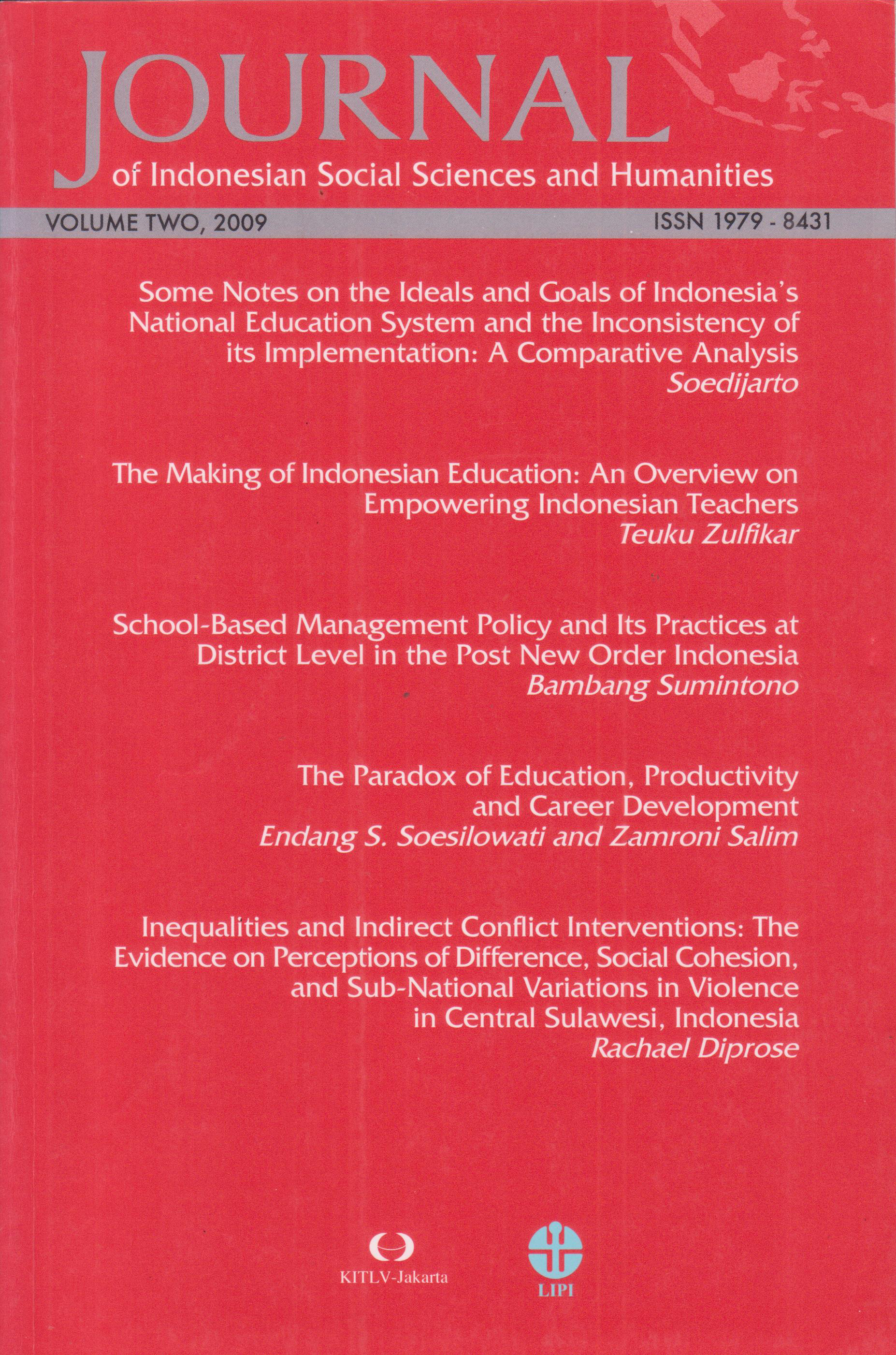School-Based Management Policy and Its Practices at District Level in the Post New order Indonesia
Abstract
The debacle of the collapse of the New Order regime in 1998 brought significant change to Indonesia’s public sector. Primary and secondary education since 1 January 2001 has been based on the new law about regional autonomy, and administered at district level rather than in the previously centralised and bureaucratic manner. At the school level, ideas about school autonomy emerged and became popular. In particular, the term ‘School Based Management’ (SBM) was seen as a panacea, and as a result, the central government issued a regulation to implement the practice of SBM. This article analyses the dynamics of the SBM policy as it was interpreted and implemented. The study was approached in two ways: through document analysis of the Ministry of National Education decree 044/U/2002 that promulgated SBM; and by soliciting and interpreting the perspectives and practices of stakeholders at district level through interviews, site studies and document analyses. The study found that the SBM policy as stated in the decree lacked clarity. The decree had been hastily introduced and emphasised structural changes at district and school levels without clarifying its underlying rationale or implementation guidelines.
References
Abu-Duhou, I (1999). School-based Management. Paris: UNESCO: International Institute for Educational Planning.
Aspinal, E and Fealy, G (eds) (2003). Local Power and Politics in Indonesia, Decentralisation and Democratisation. Singapore: Institute of Southeast Asian Studies.
Bangay, C (2005). Private Education: Relevant or Redundant? Private Education, Decentralisation and National Provision in Indonesia. Compare 35 (2) pp. 167–179.
Brown, DJ (1990). Decentralization and School-Based Management. London: Falmer Press.
Bulock, A and Thomas, H (1997). Schools at the Centre? A Study of Decentralisation. London: Routledge Falmer.
Burki, SJ, Perry, EG and Dillinger, WR (1999). Beyond the Center: Decentralizing the State. Washington DC: The World Bank.
Daun, H (2002). Educational Restructuring in the Context of Globalization and National Policy. New York: Routledge Falmer.
Davies, L, Harber, C and Dzimadzi, C (2003). Educational Decentralisation in Malawi: a Study of Process. Compare 33 (2), pp. 139–154.
Fiske, E. B. (1996). Desentralisasi Pengajaran, politik dan konsensus (Decentralization of Education, politics and consensus) (B. Bengoteku, Trans.). Jakarta: Grasindo.
Fullan, M and Watson, N (2000). School-Based Management: Reconceptualizing to Improve Learning Outcomes. School Effectiveness and School Improvement. 11 (4). pp. 453–473
Gershberg, AI (1999). Education ‘Decentralization’ Process in Mexico and Nicaragua: Legislative Versus Ministry-led Reform Strategies. Comparative Education. 35 (1). pp. 63–80.
Hawkins, JN (2000). Centralization, Decentralization, Recentralization, Educational Reform in China. Journal of Educational Administration. 38 (5), pp. 442-454.
Jalal, F and Musthafa, B (eds). (2001). Education Reform in the Context of Regional Autonomy: The Case of Indonesia. Jakarta: Ministry of National Education, National Development Planning Agency and The World Bank.
McGinn, N and Welsh, T (1999). Decentralization of Education, Why, When, What and How? Fundamentals of Educational Planning – 64. Paris: UNESCO. Available at: http://www.unesco.org/iiep
Ministry of National Education (MoNE) (2002). Keputusan Menteri Pendidikan Nasional Republik Indonesia No.044/U/2002 tentang Dewan Pendidikan dan Komite Sekolah [The Decree of the Minister of National Education of the Republic of Indonesia number 044/U/2002 concerning Education Councils and School Committees]. Jakarta.
Murphy, J and Beck, LG (1995). School-Based Management as School Reform, Taking Stock. Thousand Oaks: Corwin Press.
Nieuwenhuis, FJ (2003). Managing Change During the Process of Decentralisation: A Question of Power and Authority. Paper presented at the International Conference on Education and Development, Oxford, UK.
Rideout, WM Jr and Ural, I (1993). Centralised and Decentralised Models of Education: Comparative Studies. South Africa: Center for Policy Analysis, Development Bank of Southern Africa.
Rondinelli, DA, Nellis, JR and Cheema, GS (1983). Decentralization in Developing Countries, a Review of Recent Experience. Washington DC: The World Bank.
Schiefelbein, E and Schiefelbein, P Three Decentralisation Strategies in Two Decades: Chile 1980–2000. Journal of Educational Administration 38 (5), pp. 412–425.
Wirt, F, Mitchell, DE and Marshall, C (1985). Perceptions of State Political Culture by Education Policy Elites. Peabody Journal of Education. 62 (4) pp. 48–60.
World Bank (2004). Education in Indonesia: Managing the Transition to Decentralisation. volume 2. revised edition, February 2004. Washington DC: World Bank.
Wylie, C (1995). Finessing Site-based Management with Balancing Acts. Educational Leadership. 53 (4) December 1995.
Downloads
Published
Issue
Section
License

This work is licensed under a Creative Commons Attribution-NonCommercial-ShareAlike 4.0 International License.
Authors who publish with this journal agree to the following terms:
1. Authors retain copyright and grant the journal right of first publication with the work simultaneously licensed under an Attribution-ShareAlike 4.0 International (CC BY-SA 4.0) license. This license allows others to remix, adapt, and build upon the work, as long as they credit the author and license their new creations under the same terms.
2. Authors may enter into separate, additional contractual arrangements for the non-exclusive distribution of the journal’s published version of the work (e.g., posting it to an institutional repository or including it in a book), provided there is an acknowledgment of its initial publication in this journal.
3. Authors are permitted and encouraged to post their work online (e.g., in institutional repositories or on their personal website) prior to and during the submission process, as this can lead to productive exchanges and increase citations of the published work (See The Effect of Open Access ).


















